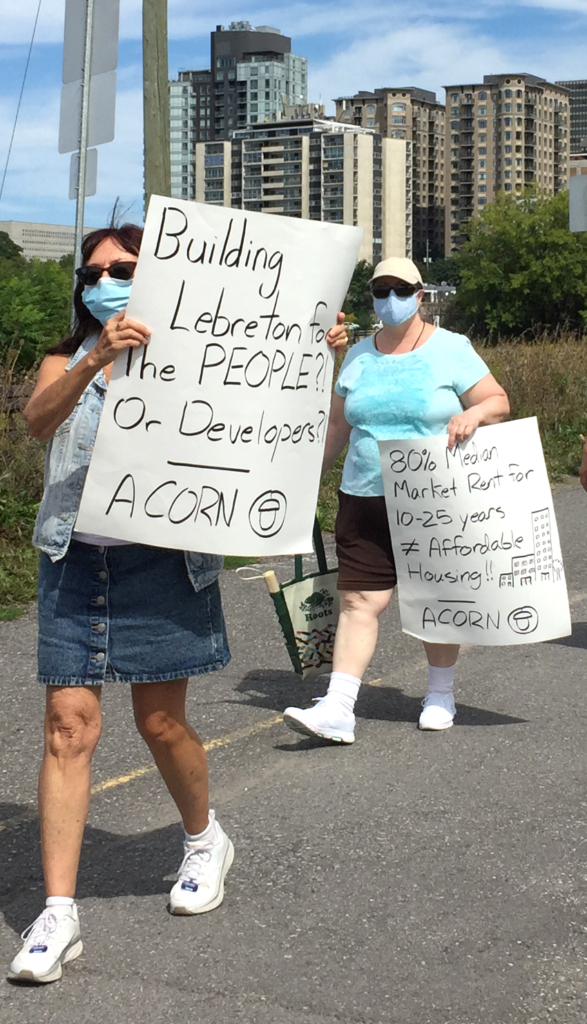
Alayne McGregor/The BUZZ
Alayne McGregor
Affordable housing – already a controversial city issue because of the recent Heron Gate development agreement – has also touched the federal election race in Ottawa Centre.
Both NDP candidate Angella MacEwen and Liberal candidate Yasir Naqvi have released specific policies about affordable housing.
Both spoke September 1 at a rally which called on political parties to protect and create more affordable housing. The rally was organized by Ottawa ACORN, an independent national organization of low-and-moderate income families. MacEwen was one of the scheduled speakers, while Naqvi arrived at the end to hold an impromptu press conference and answer questions.
The 30 ACORN members at the rally held signs and banners saying “A housing homelessness crisis isn’t fixed by tearing down the homes that are already there”, “Housing for the People”, “Tenant rights are human rights”, and “80% Median Market Rent for 10-25 years ≠ Affordable Housing.”
At the rally, MacEwen described rents in Ottawa as “out of control. I am talking to people who are spending 70 percent of their income on rent and going to the food bank to meet their basic needs. Every year their rent keeps going up and their wages don’t. There’s already a waitlist of 10,000 people looking for subsidized affordable housing rent geared to income. We have another whole group of people who aren’t on that waitlist yet that don’t know what they’re going to do next year when their rent goes up.”
She said housing should be affordable for seniors on basic incomes or people earning minimum wage, and promised deeply affordable housing at LeBreton Flats and Tunney’s Pasture. On her website, MacEwen promises 10,000 units of deeply affordable housing in this riding over the next 10 years, plus interim relief for families who cannot afford current rents. She says she is committed to non-market, co-op housing that is deeply affordable, and a strong Community Benefits Agreement for LeBreton Flats.

Alayne McGregor/The BUZZ
Naqvi has announced a goal of 1700 more new affordable and accessible homes to reduce chronic homelessness through the National Housing Strategy and Rapid Housing Initiative. He will also seek investments in energy efficient retrofits of existing community housing.
Conservative candidate Carol Clemenhagen and Green candidate Angela Keller-Herzog have no riding-specific housing policies. The three-sentence Conservative housing platform promises to build one million homes in the next three years but doesn’t mention affordability.
The extensive Green housing platform promises to declare housing affordability and homelessness a national emergency, and to redefine affordable housing using a better, updated formula that accounts for regional variations across the country, as well as establishing a moratorium on evictions until the pandemic is over.
Ottawa ACORN board member Norma-Jean Quibell said the rally was being held at LeBreton Flats because it is the largest piece and undeveloped land in Ottawa’s core – and is owned by the federal government. That area could be a site of deeply affordable housing, but the National Capital Commission’s master concept plan is coming up short, she said.
“This is government-owned land. This isn’t a private developer, We should expect a lot more.”
The NCC has committed to some affordable housing, but with no clear definition of what that means. One definition is 80 percent of average market rent, which is “not affordable for people who need it the most.” As well, the NCC’s master concept plan references CMHC programs that only require housing to be “affordable” for 10-25 years, she said.
Quibell said that, with rents continuing to increase, the most vulnerable people in society are losing the ability to have housing that’s affordable and adequate (both for family size and for disabilities).
ACORN’s federal housing platforms calls for
- protecting existing affordable housing from gentrification and renovictions of existing tenants;
- ending the income tax exemptions to Real Estate Investment Trusts;
- for the CMHC to add affordable housing preservation conditions on all financing agreements with developers;
- creating a national non-profit acquisition strategy; and
- building a minimum of 1.2 million units of affordable housing in the next decade, with the housing kept affordable for perpetuity.

Similar issues at the city
Similar issues have been raised recently at Ottawa City Council during the debate over a “social contract” guaranteeing affordable housing in the Heron Gate area in southeast Ottawa, where many currently affordable units have been demolished and replaced with more expensive units.
One issue was how long a rental unit should remain affordable. The Heron Gate agreement, for example, limited the number of years that a unit was required to remain affordable, which Councillor Jeff Leiper termed “slow-motion gentrification.”
And defining “affordability” proved difficult. It is often termed to be 30 percent of income, but should that income be Ottawa’s overall median income of $109,500, or full-time minimum wage salary? Thirty percent of the median income equates to a monthly rent of more than $2,700.

1 comment for “Affordable for whom? becomes the housing debate”